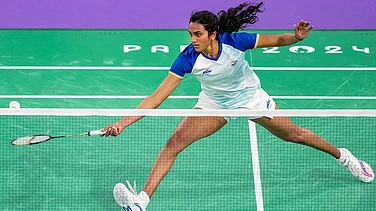When Naomi Osaka, the young2 Japanese tennis sensation, stepped on to the court for her first match at the US Open in 2020, there was a gasp from the crowd: the words ‘Breonna Taylor’ were embossed in stark white on the black mask she wore, for this was when the pandemic was still raging. Taylor was the 26-year-old Black medical technician who had been shot dead by one of the posse of plainclothes police officers who had barged into her home in Louisville, Kentucky and opened fire. Osaka was paying tribute to a victim of racial violence. By doing so, she was breaking the rules of the game, according to those who believe that sports and politics should not mix. The ‘Black Lives Matter’ (BLM) movement had peaked that summer after the murder of George Floyd, leaving the US a nation deeply divided. Osaka was aware that she had ruffled several feathers by bringing her activism to the tennis court. Many were shocked that a ‘slip of a girl like Osaka’ was getting into social issues when she could make better use of her time focusing on her game instead.
Osaka, with a Japanese mother and a Haitian father, grew up in the US facing racial discrimination. Her talent in tennis could not protect her from racism but Osaka had a mind of her own. She believed that her celebrity status as a tennis star gave her the perfect platform to raise awareness of social justice. Unlike in football or cricket where sportsmen were taking the knee to show support as a team, here, she stood alone without the comfort of being backed either by her peers or tennis officials.
As she progressed through the tournament to reach the finals, she sported masks with the names of six other victims—Elijah McClain, Ahmaud Arbery, Trayvon Martin, George Floyd, Philando Castile and Tamir Rice. She made a powerful statement of support for the BLM movement. Osaka went on to win the US Open that year but she did more than that by showing her commitment to justice for Black women faced with a history of discrimination in sport.
Much before Osaka, the Williams sisters had exposed the racism and sexism prevalent in international tennis. Stardom and her incredible talent on the court did not insulate Serena Williams, winner of 23 Grand Slam titles, from racist slurs. In an interview with British Vogue in 2020, she said, “Now, we as Black people have a voice—and technology has been a huge part of that,” said Williams. She added, “We see things that have been hidden for years; the things that we as people have to go through. This has been happening for years. People just couldn’t pull out their phones and video it before.”

In 2018, when she was deducted a point for smashing her racket in frustration at the US Open finals, she called out the differential treatment that female players have to endure. Billie Jean King, the first woman tennis superstar regarded by many as one of the greatest tennis players of all time, praised Williams for bringing attention to the double standard. Williams’ equally talented sister Venus had also spoken out against both racism and sexism in the world of tennis. In 2001, Serena was subjected to racist slurs while playing at the BNP Paribas Open tournament at Indian Wells, California, after which she boycotted the tournament for 14 years. For the Williams sisters, it had more to do with what they faced as Black tennis players in a game that was predominantly white, wealthy and male-dominated. The BLM movement was still on the distant horizon.
Dissent at the Tokyo Olympics
The 2020 Tokyo Olympics was a year when women players came into focus like never before. Held at a time when the murder of George Floyd had shocked the world’s conscience and gotten people to take to the streets at the blatant injustice done to Black people in the US, the games attracted maximum eyeballs because women players championed the cause of gender equality by taking ownership of what they chose to wear. German women gymnasts at the Tokyo games eschewed the leotard (a one-piece garment that extends from the torso to the crotch) for the unitard (that covers the entire body including the legs.) This was done to stop the sexualisation of female gymnasts, with team members stating that they preferred to wear what they were comfortable with.
The public mood was such that the International Olympic Committee (IOC), a conservative non-governmental sports organisation that strictly forbids political, racial or religious protests during the games, was forced to change its rules. The new regulations that came into effect during the Tokyo games allowed players to ‘express their views’ as long as they were not aimed at particular countries, organisations or groups and was done without disruption.
At the Tokyo Olympics, nearly 49 percent of participants were women, the maximum to date. However, the IOC continues to miss its target of a minimum of 20 percent of women on the committee.
At the Tokyo Olympics, women’s soccer teams of multiple countries (UK, US, Chile, New Zealand and Sweden) began their matches by taking the knee in a gesture of support for racial justice. Luciana Alvarado, 18, the first gymnast from Costa Rica to qualify for the Olympics, concluded her floor exercises by taking the knee and raising her fist to show her commitment for BLM.
During the track and field Olympic trials, hammer thrower Gwen Berry, 33, turned away from the stands as the US national anthem was being played. Instead, after receiving her medal, she held up a t-shirt with the words ‘Activist Athlete’ written on it. She was roundly criticised but Berry argued that she had been set up, as she was told that the anthem would be played as they got down from the stand. She said later that “My purpose and my mission are bigger than sports,’’ and added, “I’m here to represent those who died due to systemic racism. That’s the important part.”
Women, Sports and a History of Activism
When Soviet tanks rolled into erstwhile Czechoslovakia in August 1968, anti-Soviet icon and Czech gymnast Vera Caslavska looked down and away when the Soviet anthem played during the medal ceremonies at the 1968 games held in Mexico City. Caslavska, who remains the only gymnast, male or female, to have won an Olympic gold in each individual event, was forced into retirement for her gesture.
As far back as 1959, Eroseanna ‘Rose’ Robinson, a Black high jumper, refused to honour the national anthem at the Pan American games held in Chicago: she stayed seated when the anthem was played because it “represented war, injustice and hypocrisy.’’ She also pulled out of a goodwill tour to the Soviet Union on the grounds that African-Americans were being used to refute Soviet propaganda on racism in the US. “I’m not a pawn to be used in your political games,” she had said. Six months later, she was charged with tax evasion; when Robinson refused to comply, she was imprisoned. In prison, Rose staged a hunger strike. All of this was over a paltry $386. Today, this would be unthinkable.
As Bob Dylan sang ‘The Times They Are A-Changin,’ But, clearly, not fast enough.
(This appeared in the print edition as "Pausing Play TO PROTEST")























